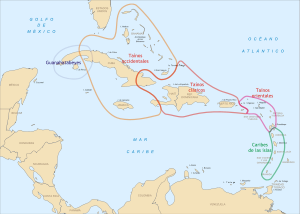- Taíno language
-
Taíno Spoken in Caribbean Ethnicity Taíno, Igneri, Lucayan Extinct (survives in Garífuna) Language family Arawakan- North
- Ta-Arawakan
- Taíno
- Ta-Arawakan
Dialects Baicawa (Hispaniola)Cayaba (Haiti and Florida Keys)Cubaba (Cuba and Hispaniola)Eyeri (Puerto Rico)Lucayo (Bahamas)Descendent: Garifuna (modern Central America)Language codes ISO 639-3 tnq 
Taíno, an Arawakan language, was the principal language of the Caribbean islands at the time of the Spanish Conquest, including the Bahamas, Cuba, Hispaniola, Jamaica, Puerto Rico, the Florida Keys, and the Lesser Antilles. The Taíno had largely displaced the non-Arawakan Ciboney, of which only pockets remained in the Greater Antilles (the Guanajatabey in western Cuba, the Ciguayo and Macorix in eastern Hispaniola), and in turn had been conquered by the Caribs in the Lesser Antilles and Puerto Rico.
As the language of first contact, Taíno was one of the most important sources of Native American vocabulary in Spanish, involving hundreds of words for unfamiliar plants, animals, and cultural practices, and through Spanish to other European languages such as English. English words of Taíno derivation include canoe, potato, cay/key, barbecue, hurricane, hammock, maize, cassava, Caribbean, cannibal, Cuba, Jamaica, Bahamas, iguana, savannah, papaya/pawpaw, guava, yucca, maguey, manatee, mangrove, chigger, and maybe tobacco.
In the Greater Antilles, the decimated Taíno soon shifted to the Spanish language, though some in the Bahamas still speak a Spanish–Taíno mixed language which is unintelligible to Spanish speakers (Ethnologue).
In the Lesser Antilles, the Carib conquest (which had advanced to Puerto Rico by the time of the Spanish conquest, and is still occurring to some extent among the Carib and Arawak in South America) created a sociolingistically interesting situation. Carib warriors invading from South America took Taíno wives, or raided north and took female Taíno captives back to the southern Antilles. The women continued to speak Taíno, but the men taught their sons Carib. This resulted in a situation where the women spoke an Arawakan language and the men an unrelated Cariban language. However, because boys' maternal language was Arawak, their Carib became mixed, with Carib vocabulary on an Arawak grammatical base. Over time the amount of distinct male Carib vocabulary was eroded, both as boys retained more and more Arawak from their first language and as women adopted male Carib words, so that both sexes came to speak Arawak (Taíno) with a strong Carib component and a decreasing amount of exclusively male Carib vocabulary.
In the interiors of the Lesser Antilles, escaped slaves bolstered the remnant Taíno–Carib population, gradually changing the racial makeup but retaining the language. This mixed population, called Black Carib, took their Arawakan language (now pronounced Garifuna, from Galibi 'Carib') with them when the Saint Vincent population was deported to the Bay of Honduras by the British in 1796. The Taíno language is now extinct in the Lesser Antilles, but Garífuna is the most numerous indigenous language in Central America. It retains the gender distinction in vocabulary, though to a minimal extent, primarily in the personal pronouns and in the choice of grammatical gender agreement of abstract words.
Dialects
Carrada (2003) lists five dialects, though three of them occur in Hispaniola:
- Baicagua (Baykawa) on Hispaniola. Bay means 'house, dwelling' and kawa means 'cave'.
- Cayaba on Hispaniola (Haiti) and on "islands".[clarification needed] From cay 'small island' and -ba locative.
- Cubaba on Cuba and Hispaniola (Haiti). From cuba 'Cuba' and -ba locative.
- Lucayo / Yucayo in the Bahamas. From lu ~ yu 'white', cay 'small island', and -o 'where'.
- Eyeri on Puerto Rico (and the lesser Antilles?), the dialect of the Igñeri Taino.[citation needed] The word for 'man' in Island Carib.
Lucayo dialect has n where other dialects have r. Haitian and Eyeri had a for o. There was variation between e ~ i and o ~ u, perhaps reflecting the three stable vowels of Arawakan.
Place names
The following are the major geographic features of the Caribbean, with their Taíno names (Carrada 2003):
- Antigua: Yaramaqui
- Cuba: Cuba ~ Coba
- Florida keys: Matacumbe
- Gonaive: Guanabo, Guanahibe
- Granada: Beguia
- Grand Turk: Abawana
- Great Inagua: Babeque
- Guadalupe: Curuqueira, Guacana, Tureyqueri, Turuqueira
- Hispaniola: Quisqueya/Haiti
- Isle of Youth/Pines: Siguanea
- Jamaica: Jamaica, Amayca
- Long Island, Bahamas: Yuma
- Martinique: Iguanacaire
- North Caycos: Kayco
- Puerto Rico: Boriquen
- San Salvador (isl.): Guanahani
- St. Croix: Ayay, Cibuquiera
- St. Vincent: Bayaruco
- Tortuga (Haiti): Cajimi, Guaney
- Vieques: Bieque
External links
- Alfred Carrada, 2003. The Dictionary of Taino Language (only partially reliable)
Categories: - North
Wikimedia Foundation. 2010.
